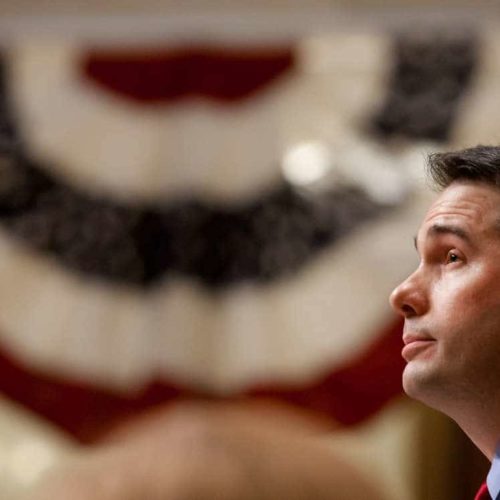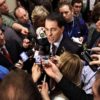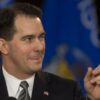Introduction
Editor’s note: Rightly or wrongly, Wisconsin Gov. Scott Walker has come to symbolize the polarization of American politics in 2012. Walker, a Republican, has drawn intense national scrutiny since he shepherded a bill through the state legislature early last year that ended collective bargaining rights for many public employees. Opponents responded with a furious petition drive that has forced Walker into a recall election June 5 against Milwaukee Mayor Tom Barrett. Spending on the race is expected to hit $80 million, much of it from groups outside the state.
On Jan. 28, 2011, two weeks before Wisconsin Gov. Scott Walker unveiled his plan to slash public employee unions’ powers, he dined at the Washington, D.C., area home of Fred Malek, a wealthy Republican power broker.
It was a taste of what would become routine for Walker.
As protesters swarmed the state Capitol and a historic effort to recall him took shape, Walker crisscrossed the nation, breaking fundraising records and netting about half his donations from out of state. He logged more time with Fox News, a national, conservative-leaning cable channel, than any other news outlet.
But his calendars show the consequences of fame and fundraising.
By January 2012, Walker scheduled about 30 hours a week for state business — half as much work time as six months earlier. On some weekdays, eight- to 12-hour time blocks were simply marked “Personal.”
“Gov. Walker would be the first person to tell you that if it wasn’t for big outside special interests and union bosses trying to recall him, he wouldn’t need to be spending any time campaigning,” spokesman Cullen Werwie said in an interview last week.
Walker, much like former Gov. Jim Doyle, keeps his official calendar open to the public but reveals few details in advance. Other appointments — personal and political — generally aren’t disclosed.
To analyze how Walker has used his time as the state’s chief executive, Wisconsin Center for Investigative Journalism reporters created a database of the more than 4,400 entries in Walker’s calendars from his first 13 months in office, through Jan. 31, 2012.
The team labeled events with categories like travel time, public relations, and time with legislators or companies.
The public can explore every entry in Walker’s calendars on the Wisconsin Center’s site here.
The calendars chronicle the life of a seemingly tireless governor. Some days list more than two dozen entries — phone calls, meetings, photo ops, speeches, travel and other work.
Walker visited at least 50 of the state’s 72 counties and numerous states. He spent a third to half his time each month traveling, often while speaking on the phone to reporters or company CEOs.
Selling policies a high priority
In August, one of Walker’s busiest months, the governor averaged 60-hour work weeks and – excluding travel time — spent a total of 42 hours on public relations.
He announced tax credits for Weldall Manufacturing in Waukesha, presided over the Governor’s Red White and Blue livestock auction at the Wisconsin State Fair in West Allis and held a “meet and greet” in his office with an Iraq veteran.
Political experts said Walker’s PR-heavy schedule wasn’t surprising, given the reaction to the collective bargaining bill.
“People were explicitly talking about recall as a measure right away,” said Dennis Dresang, founding director of the La Follette School of Public Affairs at the University of Wisconsin-Madison, who signed a recall petition. “So right from the start he felt beleaguered and as if he had to maintain high positive visibility in order to retain his job.”
But Werwie had a different explanation: “It’s fair and responsible, and really (Walker’s) job to do his part to show what we’ve been doing for Wisconsin and the impact it’s had on our schools and on all taxpayers and citizens.”
Uptick in personal time
Walker’s official work schedule shrank in the fall and winter, when his calendars note less time spent meeting business leaders and staff, interviewing candidates for appointments and working on open records requests.
Meanwhile, far more time was labeled “PERSONAL 1.” Such entries lacked other details, but news reports from those days describe Walker jet-setting around the country for fundraising and other political events, such as the Republican Governors Association conference in late November, neoconservative Grover Norquist’s Christmas party in Washington, D.C., and Walker’s $2,500-a-person January fundraiser in New York hosted by Maurice Greenberg, founder of the insurance giant American International Group.
“The governor is a public servant,” said Dean Pagani, who covers gubernatorial issues from Washington, D.C., at GovernorsJournal.com and was chief of staff to Republican former Gov. John Rowland of Connecticut. “You want to know that he or she is paying attention to the problems of the state, not spending too much time promoting himself or herself and his own career.
“It’s a very basic question that should always be asked: Is he doing his job?” Pagani added.
Walker spent two grueling days in December giving 15- to 20-minute interviews with 25 news outlets. But the next month, the calendars clocked just two hours for media: two TV interviews in Milwaukee, an open press call and a conference on his children’s reading initiative, Read to Lead.
A handful of entries in the fall were blacked out entirely. Werwie described these as “haircuts, parent teacher conferences, family events, as well as other personal items.”
No mention of John Doe
The calendar entries are silent on one subject: the John Doe investigation that’s been swirling around the governor and his former aides.
Activities involving Kelly Rindfleisch, Walker’s fundraising director, appear in March and April 2011 but lack details. “Phone call to your CELL: Kelly will provide information,” reads one entry. Rindfleisch, who was Walker’s deputy chief of staff when he was Milwaukee county executive, was charged in January this year with four felony counts of misconduct in office for allegedly campaigning on county time. Walker has repeatedly declined to discuss the investigation, citing its secrecy.
Walker faces Democratic nominee Tom Barrett in a recall election scheduled for June 5.
Next: How Walker sold his policies — and himself — in and outside Wisconsin.
The nonprofit and nonpartisan Center (WisconsinWatch.org) collaborates with Wisconsin Public Television, Wisconsin Public Radio, other news media and the UW-Madison School of Journalism and Mass Communication. Works created, published, posted or disseminated by the Center do not necessarily reflect the views or opinions of UW-Madison or its affiliates.
Read more in Money and Democracy
Money and Democracy
Super PAC cash plays big role in Nebraska Senate race
Favored candidate besieged by negative ads
Money and Democracy
New GOP super PAC aimed at attracting youth vote
American Crossroads a major donor




Join the conversation
Show Comments